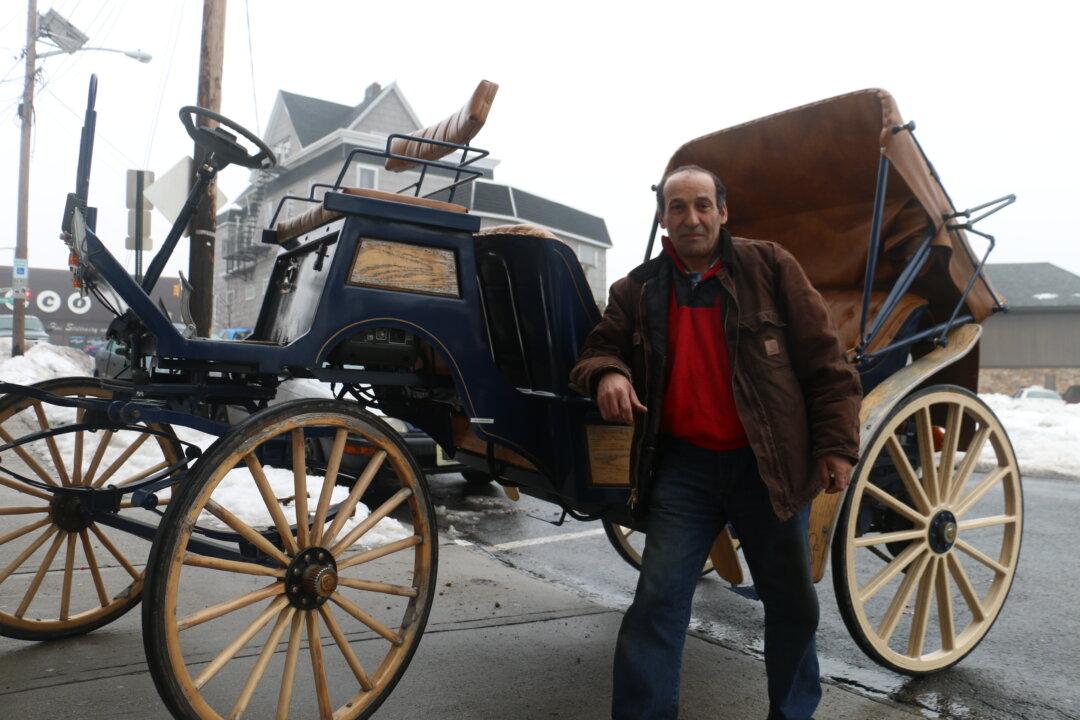NEW YORK—The horse-drawn carriages that line the south end of Central Park, could soon be a thing of the past. Mayor Bill de Blasio promised to ban them during his election campaign and has refused to change his position since he took office.
The mayor does not have the power to single-handedly make this decision, but City Council, which has walked lockstep with him so far, does.
If banned, about 300 carriage drivers and owners could be out of business.
De Blasio wants to replace the carriages “with electric, vintage-replica tourist-friendly vehicles that provide jobs for current drivers.” Some carriage drivers reject the plan entirely, while others, preparing for the worst, are innovating.
Alex Gerami, the manager of his family owned business Chateau Stables, has retrofitted a $5,000 carriage with a battery, steering wheel, brakes, and lights. He said all together, it cost him about $10,000 to retrofit, and another $1,000 to $2,000 in time.
“It’s a hybrid, it’s green, you don’t do any pollution for the city and it works with a battery, and [it’s] 100 percent safe,” said Gerami.
He added that, since it can work without a horse, it can still be outside when the weather is too bad for the animals, and it will be safer driving in traffic.
It has a large, golf-cart-sized battery attached at the back that has a four- or five-hour life span. Gerami said that a typical carriage ride lasts half an hour, so it could potentially do 10 rides before it needs to be recharged.
There are a few reasons groups like New Yorkers for Clean, Livable, and Safe Streets (NYCLASS) and the American Society for the Prevention of Cruelty to Animals (ASPCA) are seeking to ban horses from the city. They said the horses are smelly, spook easily in traffic, and are overworked and poorly treated.
Carriage drivers dismiss these claims. The stables built for the horses meet all the required standards, and the horses get an annual break where they can range freely.
Betting on Their Horses
An electric vintage replica car would cost around $150,000, a price that carriage drivers say would be too high to afford. But even the cheaper electric carriage option is not popular with drivers, and for many of the same reasons as electric cars.
“It’s not viable for hack service. The batteries don’t last long enough, they’re not appropriate for all day long out here,” said Christina Hansen, a carriage driver in New York City.
She said installing a battery that lasts all day would be much too big for the carriage and the city would never install charging stations around Central Park because it is protected as a historical site.
Carriage drivers are also concerned that they would not be able to work on holidays and weekends when Central Park is closed to vehicles.
But more important to the drivers is the idea of replacing a horse with a battery.
“It’s not an option for us, driving an electric vehicle with electricity,” said Colm Glennon, another New York City carriage driver. “I have dogs and cats, am I going to replace them with robots?”
“People come here for the horse first and foremost. They don’t come here for the carriage,” said Hansen. “Why would anyone want to ride in one? It’s just a giant golf cart that looks funny. It takes away the entire charm of the business. We wouldn’t want to do it without our horses, that’s why we are here.”
Hansen said she would sue the mayor before giving in to what she calls his “moral belief” that horses do not belong in New York City. She is optimistic that the industry will long outlast the mayor’s tenure.
Holly Kellum is a special correspondent in New York.
See Epoch Times article “Activists Ramp Up Efforts to Ban Horse-Drawn Carriages” for a closer look at the conditions in which horses are kept in the city.





